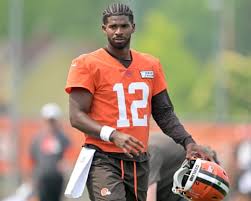Shedeur Sanders’ Recent Speeding Citations Highlight the Thin Line Between Success and Failure in Professional Sports
Listen to this article:
Keywords: athlete accountability, professional sports career, college athlete advice, sports decision making, athlete character development, professional sports mistakes
The margin for error in professional sports has never been smaller. For young athletes dreaming of competing at the highest level, understanding this reality could be the difference between achieving those dreams and watching them disappear.
Cleveland Browns rookie quarterback Shedeur Sanders recently provided a stark reminder of how quickly things can change. Within two weeks of being drafted, Sanders received two speeding citations that have raised serious questions about his judgment and professional readiness.
The incidents tell a troubling story: On June 6, Sanders was cited for driving 91 mph in a 65 mph zone. After missing his court date on June 16, he was pulled over again just hours later – this time for driving 101 mph in a 60 mph zone on Interstate 71.
The Professional Standards Reality
These aren’t just traffic violations. They represent a fundamental misunderstanding of what it means to be a professional athlete in today’s landscape.
“I made some wrong choices personally and I can own up to them,” Sanders said when addressing the situation at a teammate’s charity event. However, analysts noted that his casual demeanor didn’t match the gravity of his words, raising questions about whether he truly grasps the implications.
Some observers have suggested Sanders could face roster consequences – a sobering reminder that talent alone doesn’t guarantee job security in professional sports.
The Business Reality: You’re Applying for an Executive Position
Professional sports organizations are multi-billion dollar businesses, and they evaluate athletes accordingly. Teams aren’t just acquiring talent – they’re hiring executives who will represent their brand, make split-second decisions under pressure, and serve as the public face of their organization.
This business reality has made organizations increasingly intolerant of character red flags, regardless of athletic ability. The modern landscape provides fewer second chances than previous generations, with social media amplifying every mistake and talent pools deeper than ever before.
The Development Imperative
Professional sports organizations understand that talent development extends far beyond athletic skills. As one NBA development coach explains, most rookies need to be “managed” – they can’t just be thrown on the court expecting minutes to turn them into superstars.
The transition from amateur to professional athletics involves more than just competing against better opponents. As one analyst notes, “You’re playing against the best players in the world every single night,” requiring complete dedication to preparation and professional standards.
Character as Business Currency
Modern sports organizations evaluate prospects through the lens of business executives:
Decision-Making Under Pressure: How players handle adversity, success, and everyday situations becomes predictive of their ability to make sound judgments when millions of dollars and organizational reputation are at stake.
Leadership and Brand Management: Veterans often serve as mentors, with one player noting the importance of “guys like Mike [Conley], guys like Marc [Gasol]” who “try to critique you and try to make your routine better” because “at one point, I want to be like them in my career – being a face of a team, being great basketball players”. This isn’t just about basketball – it’s about becoming a business leader.
Return on Investment: Teams invest hundreds of millions in salaries, facilities, and infrastructure. They need athletes who protect and enhance that investment through consistent professional behavior, much like any corporation expects from its C-suite executives.
The Professional Mindset Framework
Successful professional athletes understand several key principles:
Accountability Without Exceptions
Taking ownership of mistakes before they become public relations crises. This means understanding that every action has potential consequences that extend beyond the individual.
Executive-Level Standards 24/7
Recognizing that professional athlete status means being a business executive who doesn’t clock out. Every public interaction, social media post, and personal decision reflects on a multi-million dollar organization, just as it would for any corporate leader.
Long-term Perspective
Understanding that career longevity depends on consistent professionalism, not just peak performance. The physical demands alone require athletes to “really, really have to take care of your body” and maintain professional habits.
Support System Utilization
Leveraging available resources – coaches, mentors, family, and advisors – to make informed decisions rather than relying solely on personal judgment.
The Stakes Have Never Been Higher
Today’s competitive landscape offers fewer second chances than previous generations. Social media amplifies every mistake, and organizations have access to more talent than ever before.
For young athletes, this business reality means:
- You’re interviewing for an executive position: College coaches, scouts, and front offices assess whether you have the decision-making capabilities of a business leader
- Character evaluation is due diligence: What might be overlooked in high school becomes part of comprehensive background checks at the professional level
- Athletic ability is the minimum qualification: Professional organizations assume talent and focus heavily on executive presence, judgment, and leadership potential
Moving Forward: The Sanders Case Study
Sanders’ situation isn’t necessarily career-defining – rookie mistakes can be learning opportunities when handled properly. However, his response and future decisions will determine whether this becomes a footnote or a defining characteristic.
The Browns organization has addressed the situation internally, but Sanders’ long-term success will depend on demonstrating genuine growth rather than simply managing public relations.
Lessons for Aspiring Professionals
Young athletes should consider several critical factors:
- Take full accountability immediately: Own mistakes completely without excuses, deflection, or minimizing consequences – organizations value athletes who demonstrate genuine responsibility
- Every decision matters: Understanding that seemingly minor choices can have major consequences
- Professional preparation starts now: Developing decision-making frameworks before reaching professional levels
- Character development is skill development: Investing time in personal growth alongside athletic improvement
- Seek guidance proactively: Utilizing mentors and advisors before crises occur
- Think like an organization: Understanding how individual actions affect team chemistry, public perception, and organizational goals
The Bottom Line
Professional sports success requires more than athletic excellence. It demands consistent demonstration of judgment, character, and professionalism that extends far beyond game performance.
Sanders’ recent citations serve as a reminder that the path to professional success is narrow and unforgiving. For young athletes watching this situation unfold, the lesson is clear: talent opens doors, but character determines how long they stay open.
The choice of how seriously to take this responsibility ultimately determines whether athletic dreams become professional reality or cautionary tales for the next generation.
For more analysis on athlete development and professional sports trends, continue following our comprehensive coverage of the evolving landscape of professional athletics.





